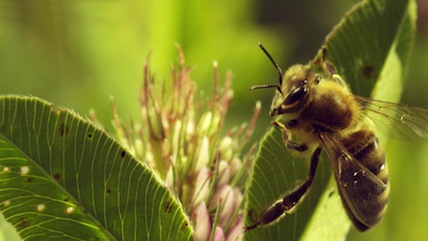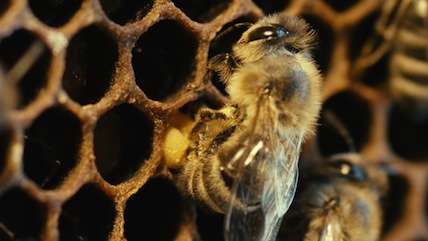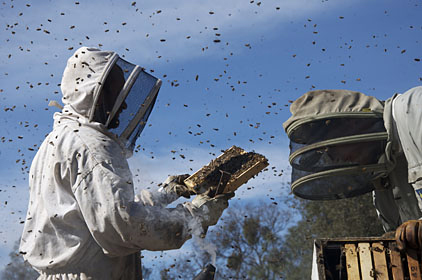Reviewed by Glenn Erickson
If you don't love honeybees already, you will after seeing Markus Imhoof's fascinating documentary More Than Honey, filmed on four continents and graced with gloriously beautiful macrophotography. The blurb associated with the title is from Albert Einstein: "If bees were to disappear from the globe, mankind would only have four years left to live." The quote makes it sound as if Imhoof's film is yet another alarmist docu, fanning the flames of apocalypse for man's sin of trifling with Mother Nature. But the unusually even-handed Swiss production avoids that stance, and gives the impression that everything will work out for the better in the world of bees and their symbiotic relationship with the plant world.
More Than Honey is a valentine to the tradition of beekeeping as seen in the story of a 3rd-generation Alpine beekeeper working with a specific black bee acclimatized to the cold of higher altitudes. Throughout the show we see the clever ways bees are tricked into a win-win proposition for humans. They pollinate flowering plants on groves and farms large and small. The beekeepers then raid their prized honey, replacing it with sugar water. In a normal bee life cycle the hive replaces a spent queen by creating another and splitting into two hives. Beekeepers instead pluck healthy queens away, force the bees to create more queens, and then spread those out to multiply the colonies by a greater factor.

The show teaches us a great deal about bees, in the process building respect for them. Excellent microphotography shows honeybees flying about with their furred bodies caked with yellow pollen, serving as cupid-like messengers for plants that cannot reproduce unassisted. The result is a beautiful illustration of nature's positive attitude toward life. We also learn about the social structure and life cycles of the bees, that work as a kind of 'multiple organism' in an organization in which every bee has a function but no individual identity, including the queen. In a healthy hive hundreds die every day, to be replaced by hundreds of new members. Some drones live only to mate, and then perish. The colony is everything.
We watch researchers unlock secrets of the well known 'bee dance', discovering that individual bees are capable of making some decisions on their own. The fieldwork is fascinating, as foraging bees with tiny radar equipment glued to their backs 'check in' during their search for new sources of pollen.
In California we meet a busy beekeeping millionaire running an enormous company that maintains thousands of bee colonies. A single enormous almond grove has hundreds of hives to be maintained. Without the bees, this agriculture could not survive, but a wealthy grower tells us that he's not worried that this one region supplies almost all of America's almonds. We travel to China to observe an entrepreneur painstakingly collecting plant pollen, due to a lack of bees. The pollen is sold in packets like seed. Hundreds of miles away an army of workers move slowly through groves, painting flowers with bits of pollen. The work seems almost absurd... making it immediately obvious how much better the job is done by bees.

All this suddenly becomes crucial because bees have been dying off, in an alarming trend that nobody has yet solved. The California beemaster ships his bees all over the country, only to see a goodly percentage of his hives wiped out. The colonies simply fail -- activity stops and the larvae in the 'brood' areas of the hive turned to mush. Up in the Alps, the bewhiskered beekeeper prides himself in the purity of his colonies, which are kept free from pesticides, poisons, etc. Just the same, his entire bee house is wiped out by an infection that can't be traced.
The docu gives us plenty of possible reasons for the worldwide bee die-off. Causes discussed are inbreeding, parasitic mites (these look horrible in the macrophotography), invasive worms, microbial diseases, pesticides, and strains placed on the colonies through forced interruptions of their natural life cycles. The California beemaster ships colonies more than halfway across the country to maximize their usefulness, and receives specially selected larval queens to build new colonies afresh. One argument is that a lack of genetic diversity is producing bees incapable of fighting off infections. But the forced diversity of mass-scale bee management seems to aid the spread of disease. Down in Australia, beekeeping researchers are establishing colonies on isolated islands, to maintain healthy strains should mainland bees suffer a catastrophic kill-off.
Yet no predictions of doom emerge. More Than Honey refuses to draw any particular conclusion, which may be wise considering the present incomplete nature of scientific knowledge. The upbeat final act introduces us to a beekeeper in the American Southwest and his adventures with the Africanized bees that have migrated North from Brazil.

Almost everything we've been told about these 'killer bees' is false. They are no more deadly than other bees, and they pollinate plants and produce honey the same as normal honeybees. Africanized bees are more aggressive. The beekeepers that work among this new breed have been forced to wear protective overalls, gloves and veils at all times. The talkative beekeeper in the Southwest likes them, however. He has found them to be very hardy, and he believes they adapt to anything. The show also makes the Africanized bees seem resistant to domestication. The beekeeper's colony soon abandons its hive. He finds that it has regrouped a mile away, halfway up a sheer rock cliff where nobody can get it at it.
If anything is off about More Than Honey, it's that this beekeeper's one opinion makes it seem like the world will be saved by the resilient Africanized bees. The truth is that scientists are still gravely concerned about the global bee kill-off and haven't yet formulated a comprehensive theory for why it is happening. The anecdotal evidence in this picture encourages viewers to conclude that man's interference in the life of bees, domesticating them on a massive scale and micromanaging their colonies for profit, may have affected the strains to the point that they're more susceptible to disease and parasites. But the movie makes no direct statement to that effect.
What we instead get in More Than Honey is a marvelous overview of the world of bees, much of it up close and personal with the industrious, attractive insects. I haven't seen anything on the subject as informative or as pleasant to watch.
Kino Lorber's Blu-ray of More Than Honey is a gorgeous HD encoding of this digitally-shot documentary marvel, with macrophotography that allows us to penetrate into active colonies, and watch ultra- close-ups of details like the tiny bee tongue in its double sheath. Some flying scenes are special effects composites, but they do not detract from the docu's realism -- none claim to be air-to-air bee cinematography.
The director Markus Imhoof appears in a lengthy interview, explaining among other things that he himself comes from a family of beekeepers. A number of deleted scenes also appear, that flesh out specific areas of the movie for viewers that would like more detail. Two making-of programs are also quite impressive... it takes an expert with unlimited patience to get some of those shots.
The show is presented with two audio tracks, an original German version and an English language track in which actor John Hurt replaces the German narrator Charles Berling. Subtitles are provided, but only for German dialogue, which leaves hard-of-hearing viewers out of luck for a big chunk of the film's running time.
On a scale of Excellent, Good, Fair, and Poor,
More Than Honey Blu-ray rates:
Movie: Excellent
Video: Excellent
Sound: Excellent
Supplements: Director interview, BTS featurettes, deleted scenes.
Deaf and Hearing-impaired Friendly?
NOT ENTIRELY; Subtitles: English, but only for German dialogue.
Packaging: Keep case
Reviewed: December 23, 2013
Republished by permission of World Cinema Paradise.

DVD Savant Text © Copyright 2014 Glenn Erickson
See more exclusive reviews on the Savant Main Page.
Reviews on the Savant main site have additional credits information and are often updated and annotated with reader input and graphics.
Also, don't forget the
2011 Savant Wish List.
T'was Ever Thus.
Return to Top of Page
|

